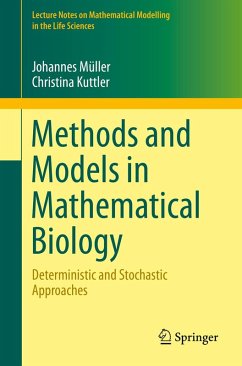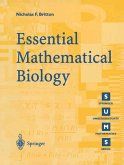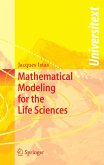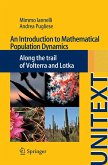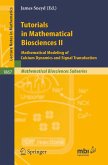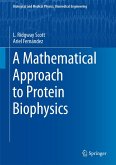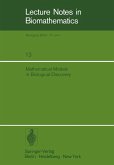This book developed from classes in mathematical biology taught by the authors over several years at the Technische Universität München. The main themes are modeling principles, mathematical principles for the analysis of these models, and model-based analysis of data. The key topics of modern biomathematics are covered: ecology, epidemiology, biochemistry, regulatory networks, neuronal networks, and population genetics. A variety of mathematical methods are introduced, ranging from ordinary and partial differential equations to stochastic graph theory and branching processes. A special emphasis is placed on the interplay between stochastic and deterministic models.
Dieser Download kann aus rechtlichen Gründen nur mit Rechnungsadresse in A, B, BG, CY, CZ, D, DK, EW, E, FIN, F, GR, HR, H, IRL, I, LT, L, LR, M, NL, PL, P, R, S, SLO, SK ausgeliefert werden.
"This extensive textbook provides an introduction to the most important mathematical tools and models used in mathematical biology. ... Each section is supplemented with exercises and each chapter has an appendix with the solutions to the exercises ... . The book concludes with an extensive bibliography and is well suited as an introduction to the subject for graduate students with a strong mathematics background and for researchers." (W. Huyer, Monatshefte für Mathematik, Vol. 186 (3), 2018)
"The core of the book is based on a two-semester graduate course on the mathematical modeling of biological systems. In my opinion, the book is targeted at graduate students with a strong mathematics background. ... The book has a very nice diversity of topics in biology and applied dynamical systems. ... There is a nice bank of exercises, at the right level for first to second year graduate students." (Zachary P. Kilpatrick, SIAM Review, Vol. 59 (1), March, 2017)
"The core of the book is based on a two-semester graduate course on the mathematical modeling of biological systems. In my opinion, the book is targeted at graduate students with a strong mathematics background. ... The book has a very nice diversity of topics in biology and applied dynamical systems. ... There is a nice bank of exercises, at the right level for first to second year graduate students." (Zachary P. Kilpatrick, SIAM Review, Vol. 59 (1), March, 2017)

